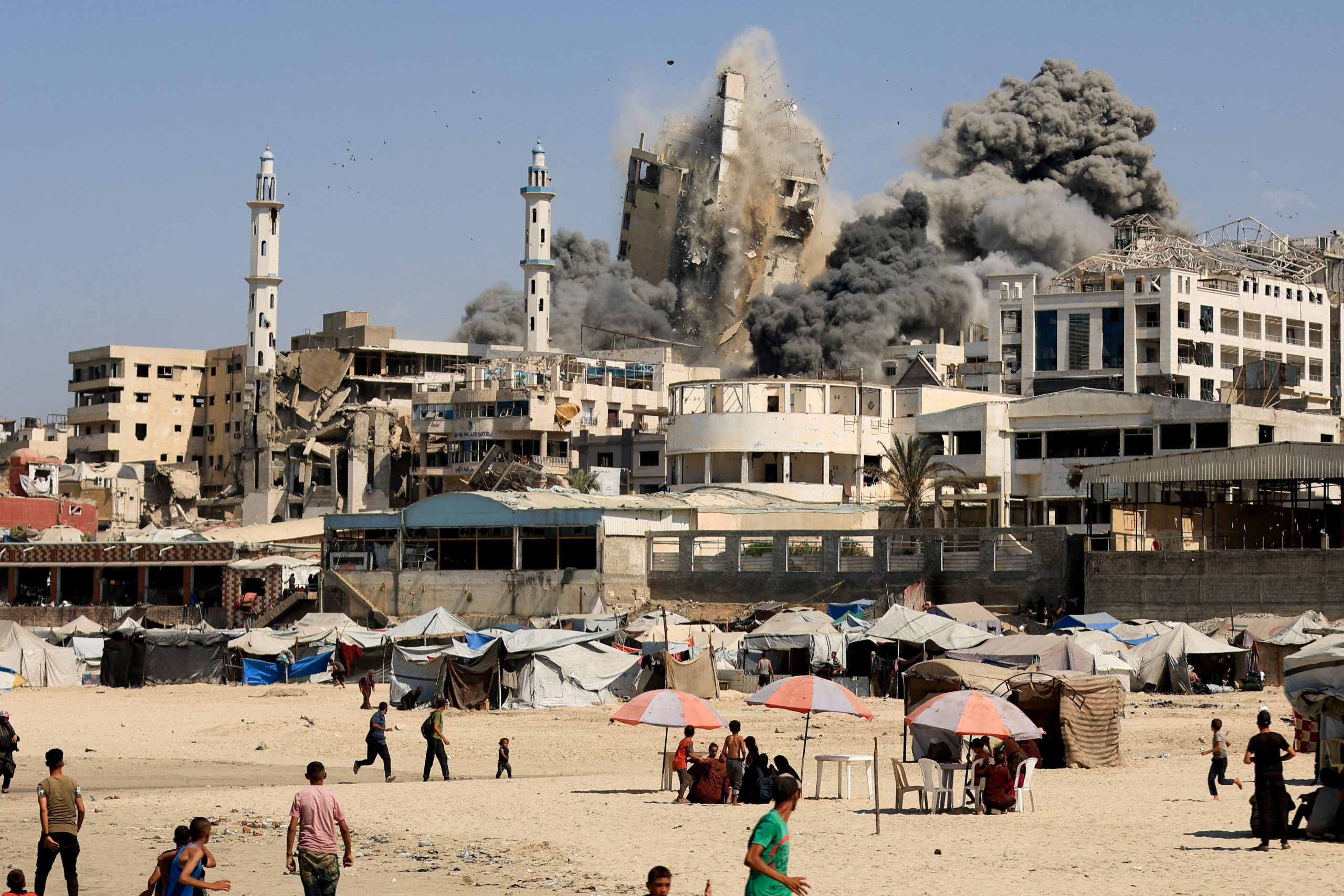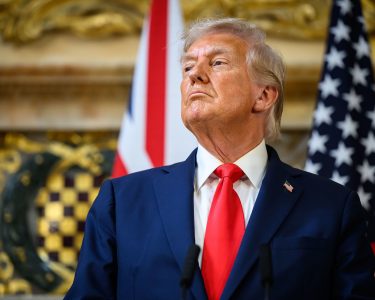- Summary
- Three major Western nations all boost Palestinian cause
- Move angers Israel, also goes against Trump’s stance
- UK, Australia and Canada take action in frustration over Gaza
- Israeli minister says the decisions reward ‘murderers’
LONDON/OTTAWA/CANBERRA, Sept 21 (AfrikTimes) – Britain, Canada and Australia formally recognized a state of Palestine on Sunday, reversing decades of unwillingness to accept Palestinians as a sovereign nation until their conflict with Israel was permanently settled and breaking sharply with the United States. The three nations became the biggest countries to recognize Palestine, acting in coordination with France, which is expected to make a similar declaration on Monday at the United Nations. Their embrace of Palestinian statehood is a momentous shift in long-standing diplomatic positions and reflects the grave consternation in many capitals over Israel’s genocidal war in Gaza.
Britain, Canada and France, the first members of the G-7 major economies to take such a step, are some of the biggest traditional Israel supporters — and U.S. allies — to recognize Palestine. Canadian Prime Minister Mark Carney, Australian Prime Minister Anthony Albanese and British Prime Minister Keir Starmer announced the decisions in rapid succession Sunday.
Starmer, in particular, has faced growing pressure from the British public and his own Labour Party to take a tougher stand against Israel’s conduct Gaza.
Today, to revive the hope of peace for the Palestinians and Israelis, and a two state solution, the United Kingdom formally recognises the State of Palestine. pic.twitter.com/yrg6Lywc1s
— Keir Starmer (@Keir_Starmer) September 21, 2025
The Sunday announcements were made a day before the start of Rosh Hashanah, the Jewish new year, on Monday evening, and seemed timed, at least in part, to avoid issuing statements certain to anger the Israeli government as the country prepared for a major holiday.

ISRAEL SWIFTLY CONDEMNS MOVE
Prime Minister Benjamin Netanyahu’s “message to nations that are taking the avenue to disregard the sheer utter chaos Hamas has thrust Gaza into and Israel — including our soldiers, families and of course hostages still held in Hamas captivity — [is] that the people of Israel aren’t going to commit suicide because of the political needs of European politics,” Shosh Bedrosian, a spokesperson for the prime minister, said Sunday.
The growing list of nations recognizing Palestine reflect how the bloodshed and upheaval following the October 7, 2023, Hamas attacks on Israel have shaken up long-static diplomatic positions.
Britain’s shift has special resonance given its controversial history governing what is now Israel and the Palestinian territories in the early 20th century under a mandate from the League of Nations — after making what critics say were unclear and contradictory promises to Arabs and Jews in the region. The U.K. has long urged the sides to negotiate an agreement that establishes two sovereign states in the still-contested area but held off recognizing a state of Palestine in advance of a settlement.
But growing public outrage over Israel’s siege in Gaza and its recent steps away from a negotiated settlement pushed the U.K. government to act. Huge demonstrations in support of Palestinians routinely fill streets in cities across Britain. More than one-third of Starmer’s cabinet had called for the move, and more than 130 members of Parliament from Starmer’s Labour Party signed a recent letter in support.
 Canada, the UK and Australia have formally recognized a Palestinian state, aligning themselves with European allies and pushing ahead with a policy that has drawn criticism from US President Donald Trump.
Canada, the UK and Australia have formally recognized a Palestinian state, aligning themselves with European allies and pushing ahead with a policy that has drawn criticism from US President Donald Trump.
STARMER RECOGNIZES PALESTINE DESPITE U.S. AND ISRAELI OBJECTIONS
British Prime Minister Keir Starmer announced Sunday that the United Kingdom will formally recognize a Palestinian state, following through on a pledge made in July. Starmer had promised in July that he would make the move before the U.N.’s September General Assembly meeting unless Israel took “substantive steps” to improve the humanitarian crisis in Gaza.
Israeli attacks have killed more than 65,000 Palestinians, according to Gaza health officials, who do not differentiate between civilian and combatant casualties but say the majority of the dead are women and children. Starmer said he would recognize Palestine unless Israel agreed to a ceasefire deal with Hamas, committed to a two-state solution and ruled out annexing the occupied West Bank. None of those conditions were met, British officials said.
Rather, in recent weeks, Israel has renewed its assault on Gaza City and launched an attack targeting Hamas officials in Doha, Qatar, the U.S. ally hosting ceasefire negotiations.
Israel, along with President Donald Trump and numerous other administration officials, has blasted the growing movement of governments that recognize a state of Palestine as “rewarding Hamas” for the resistance group’s surprise attacks that killed about 1,200 Israelis and displaced tens of thousands more.
Starmer rejected that criticism.
“This solution is not a reward for Hamas,” Starmer said Sunday. “Our call for a genuine two-state solution is the exact opposite of [Hamas’s] hateful vision.”
 Displaced Palestinians, fleeing northern Gaza due to an Israeli military operation, move southward, using a vehicle packed with personal belongings, after Israeli forces ordered residents of Gaza City to evacuate to the south, in the central Gaza Strip, September 21, 2025.
Displaced Palestinians, fleeing northern Gaza due to an Israeli military operation, move southward, using a vehicle packed with personal belongings, after Israeli forces ordered residents of Gaza City to evacuate to the south, in the central Gaza Strip, September 21, 2025.
Britain’s announcement, though expected, provided a striking coda to Trump’s pomp-and-comity-filled state visit that concluded Thursday evening. The prime minister, speaking beside Trump at a news conference Thursday, said accepting Palestine as a state was needed to address the “intolerable” destruction and depravation in Gaza and to steer the broader conflict back toward a sustainable long-term settlement. The issue was the only major point of disagreement to emerge publicly during the carefully choreographed two-day visit.
At the news conference, Trump acknowledged “a disagreement with the Prime Minister on that score” but in less harsh language than from some of his senior aides or from Netanyahu, who had accused Starmer of “appeasing” Hamas.
“A jihadist state on Israel’s border TODAY will threaten Britain TOMORROW,” Netanyahu said in a statement on X.
Starmer said the move should be seen as “part of that overall package which hopefully takes us from the appalling situation we’re in now to the outcome of a safe and secure Israel, which we do not have, and a viable Palestinian state.”
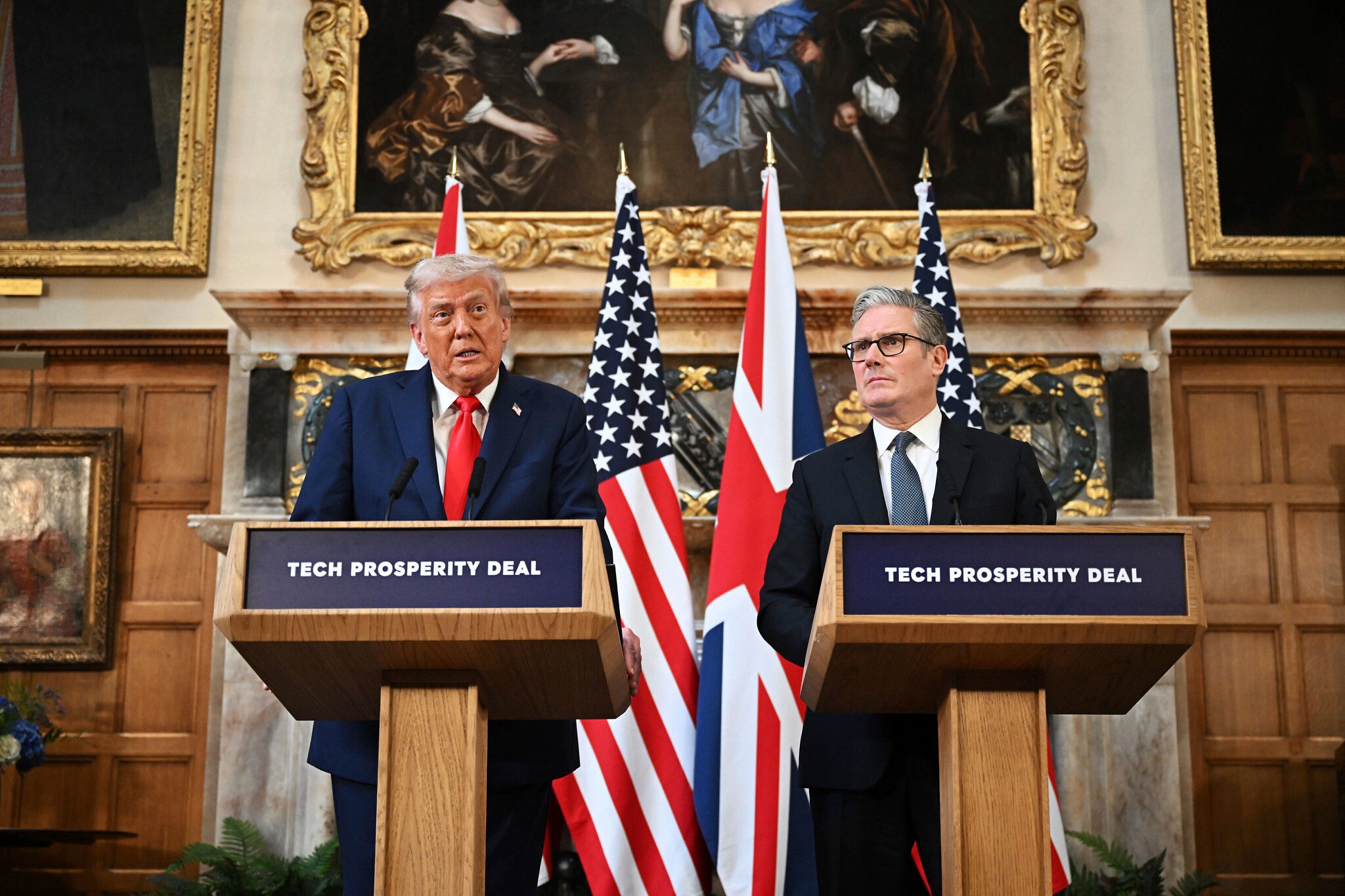 US President Donald Trump and UK Prime Minister Keir Starmer hold a joint press conference at Chequers, near Aylesbury, England, September 18, 2025. Trump expresses disagreement with Starmer’s plan to recognize a Palestinian state.
US President Donald Trump and UK Prime Minister Keir Starmer hold a joint press conference at Chequers, near Aylesbury, England, September 18, 2025. Trump expresses disagreement with Starmer’s plan to recognize a Palestinian state.
Starmer denied that extending statehood to more than 5 million Palestinians in the West Bank and Gaza was a reward for Hamas. He condemned the group as “a terrorist organization who can have no part in any future governance in Palestine.” In response to that, Trump patted him on the back approvingly, suggesting Britain’s position would not cause a significant conflict with Washington.
Politicians from across the British political spectrum have condemned Israel’s actions in Gaza, but Starmer’s move to recognize Palestine was criticized by some conservatives. Kemi Badenoch, the leader of the Tory party, accused the prime minister of “moral confusion.”
“It sends a signal to terrorists and tyrants alike that Britain no longer knows which way it is going,” Badenoch wrote in the Telegraph newspaper Saturday.
More than 140 countries already recognize Palestinian statehood, and the U.N. granted the governing Palestinian Authority nonmember observer status in 2012. The moves by Britain, France, Canada and Australia will not amount to a promotion to full nationhood within the world body, however. That elevation would still depend on a vote in the U.N. Security Council, where the United States remains ready to veto such proposals.
On Thursday, Washington vetoed for the sixth time a Security Council resolution calling for an immediate ceasefire in Gaza and the release of hostages. The resolution was backed by all 14 other council members, but U.S. officials argued it did not adequately condemn Hamas or affirm Israel’s right to self-defense.
The value in the momentum toward statehood remains, for now, symbolic, said Yossi Mekelberg, a senior fellow at Chatham House, a London think tank. Unless followed by additional specific attempts to pressure Israel — such as limiting arms sales, imposing sanctions on individuals and organizations or restricting trade — the recognition will probably further isolate the Jewish state but not sway its right-wing government, Mekelberg said. “This is changing the dynamic; it’s adding to the momentum,” he said. “But it will make very little difference if it’s not followed by concrete steps.”
Palestinians, however, welcomed the announcement. The Palestinian mission in London said it plans to hold a flag-raising ceremony Monday at its office in Hammersmith, which will now be regarded as an embassy by the British government. The flag has long flown at the site, but recognition elevates its diplomatic significance.
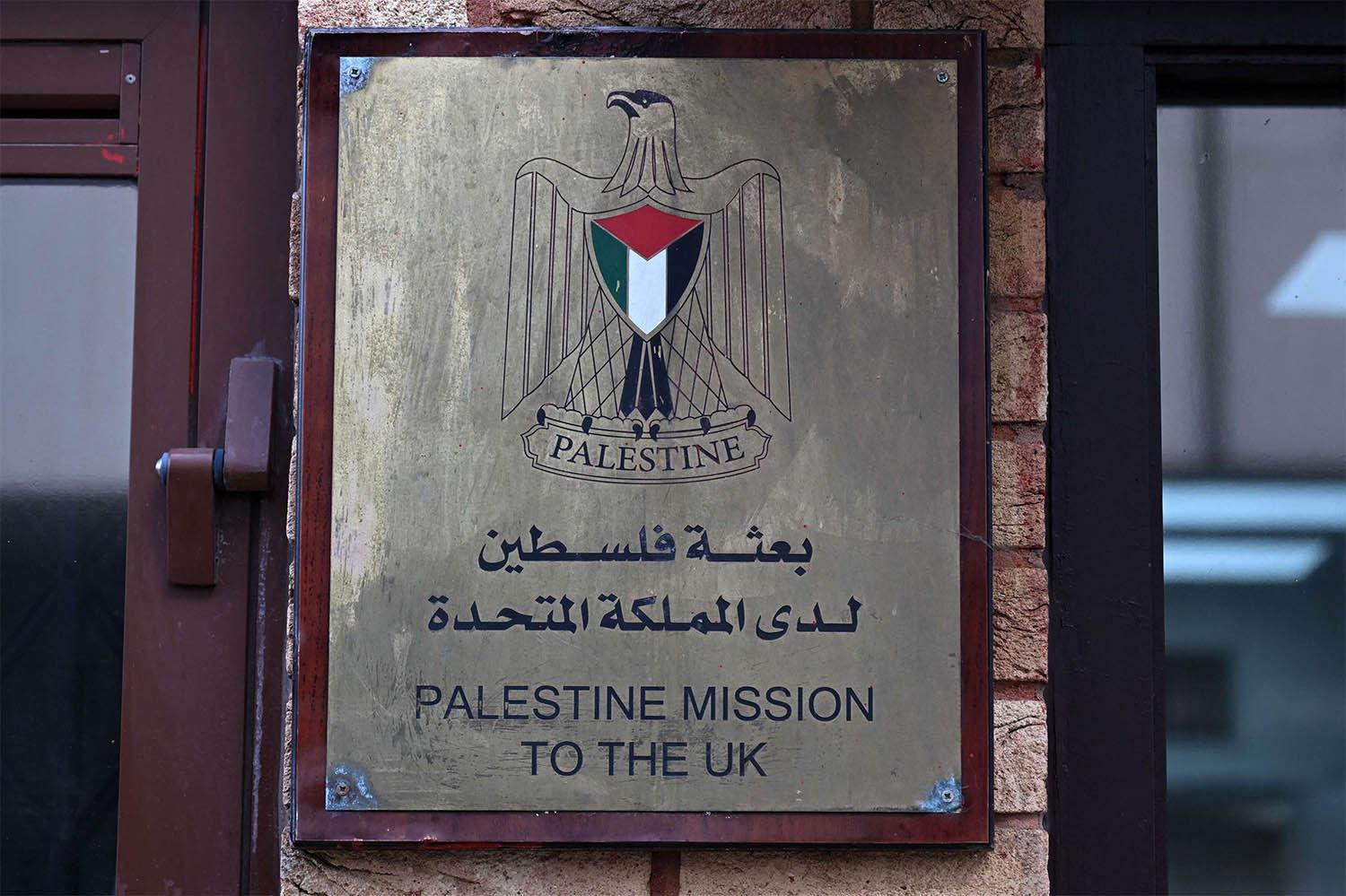 The three nations’ decision aligns them with about 140 other countries which also back Palestinians’ aspiration to forge an independent homeland from the Israeli-occupied territories.
The three nations’ decision aligns them with about 140 other countries which also back Palestinians’ aspiration to forge an independent homeland from the Israeli-occupied territories.
“Everyone is focused on recognizing Palestine while Gaza is being erased,” Buttu said.
The Palestinians’ growing status as a recognized nation could help clarify the conflict in the international community, she said. “It’s not just Israel occupying the territories, it’s a state occupying another state,” she said. That was the dynamic when Iraq invaded Kuwait, she noted, spurring a massive international response on the grounds of violated sovereignty.
Britain, additionally, had a special responsibility to recognize Palestinian statehood given its historic role, Buttu said. The British “Balfour Declaration” of 1917 had been one of the first and most consequential calls for a Jewish “homeland” to be carved out of the mandate territories. And many of the laws that Israel still uses to detain Palestinians without judicial oversight date to the British mandate period, she said.
“Given that the British were the ones who gave away Palestine, this [recognition] is powerful,” Buttu said. “But it’s not enough.”
BRITAIN’S HISTORIC ROLE AND REACTIONS TO RECOGNITION
Britain’s recognition carried symbolic weight given its deep historical ties to the region. British troops captured Jerusalem from the Ottoman Empire in 1917, and in 1922 the League of Nations awarded Britain an international mandate to administer Palestine during the post-war deal-making that redrew the map of the Middle East.
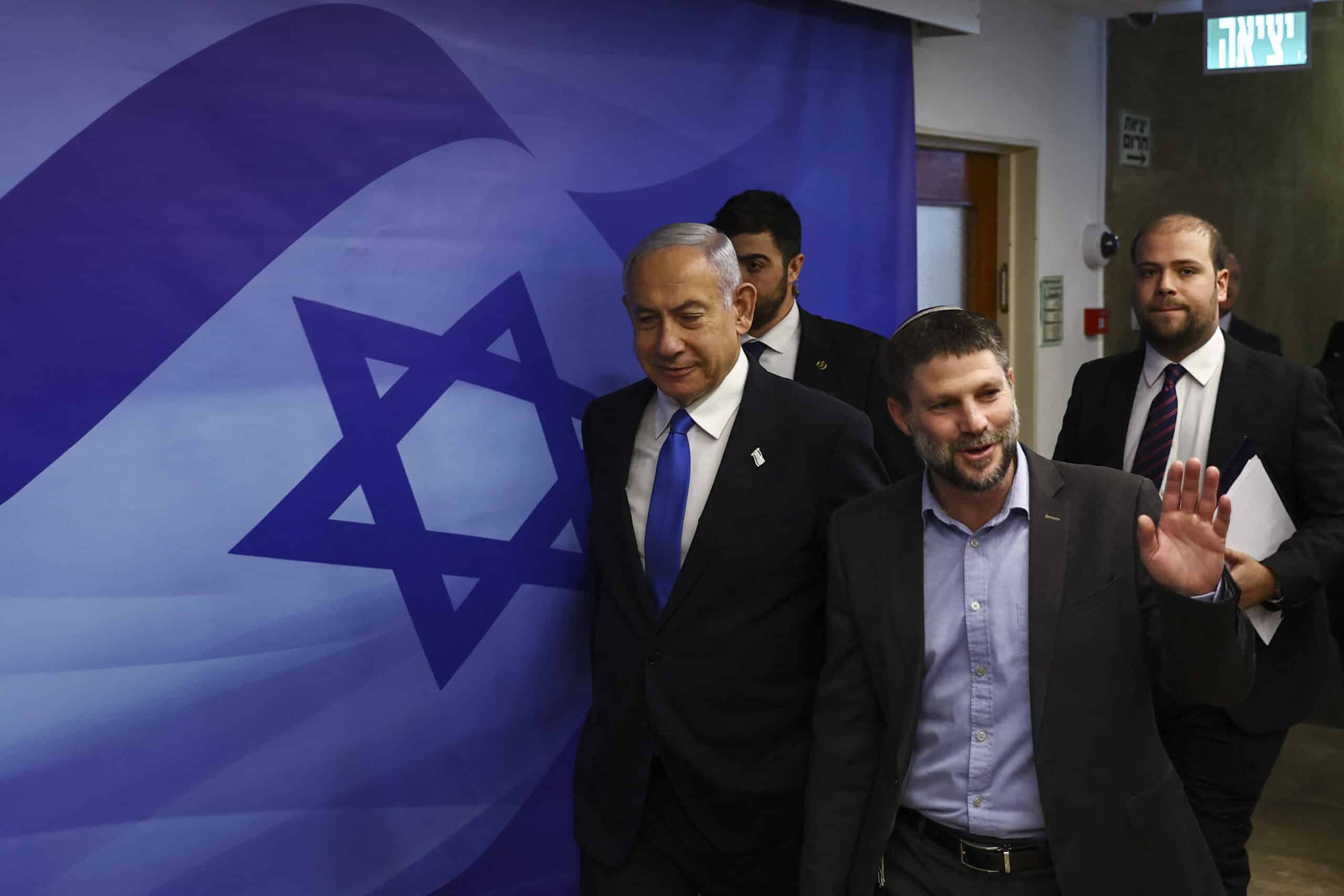 Israeli Prime Minister Benjamin Netanyahu (left) with Finance Minister Bezalel Smotrich. Smotrich and National Security Minister Itamar Ben-Gvir were sanctioned by five countries over incitement to violence and human rights abuses against Palestinians, with their assets frozen and entry banned.
Israeli Prime Minister Benjamin Netanyahu (left) with Finance Minister Bezalel Smotrich. Smotrich and National Security Minister Itamar Ben-Gvir were sanctioned by five countries over incitement to violence and human rights abuses against Palestinians, with their assets frozen and entry banned.
For some, the move reignited painful debates. Mandy Damari, the British mother of released British-Israeli hostage Emily Damari, told Reuters on Sunday that Starmer was “under a two-state delusion,” given that the Gaza Strip’s government is still Hamas, whose mission is to destroy Israel.
“He is rewarding Hamas for the 7th October barbaric and savage attack on Israel when the hostages are still not back, the war is not over and Hamas are still in power in Gaza,” she said.
Israel’s opposition leader Yair Lapid also criticised the “unilateral” recognition of a Palestinian state in a post on X, but blamed the Netanyahu government as well, saying it “could have prevented this through professional diplomatic dialogue.”
In contrast, Husam Zomlot, head of the Palestinian Mission to the UK, watched on his phone as Starmer announced Britain’s recognition of a Palestinian state. At the London headquarters of the mission, which may now be upgraded to an embassy, there were smiles and embraces.
“We realise that the recognition will not bring back the lives that we have lost,” Zomlot told reporters. “Because of the lack of this recognition … things have been left to fester all the way to genocide being committed in full view of the world.
“Today is a moment when the UK Prime Minister and the British government, on behalf of their people, stand and say: ‘We must correct history, we must right the wrongs.”
 As of March 2025, the State of Palestine has been recognised as a sovereign nation by 147 of 193 member states of the United Nations.
As of March 2025, the State of Palestine has been recognised as a sovereign nation by 147 of 193 member states of the United Nations.
Claire Parker contributed from Cairo.


